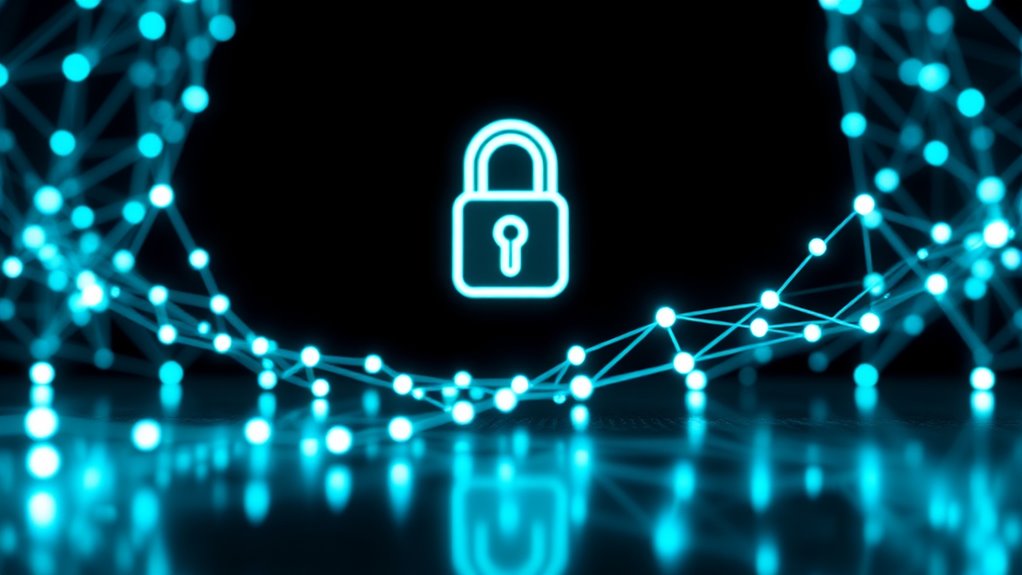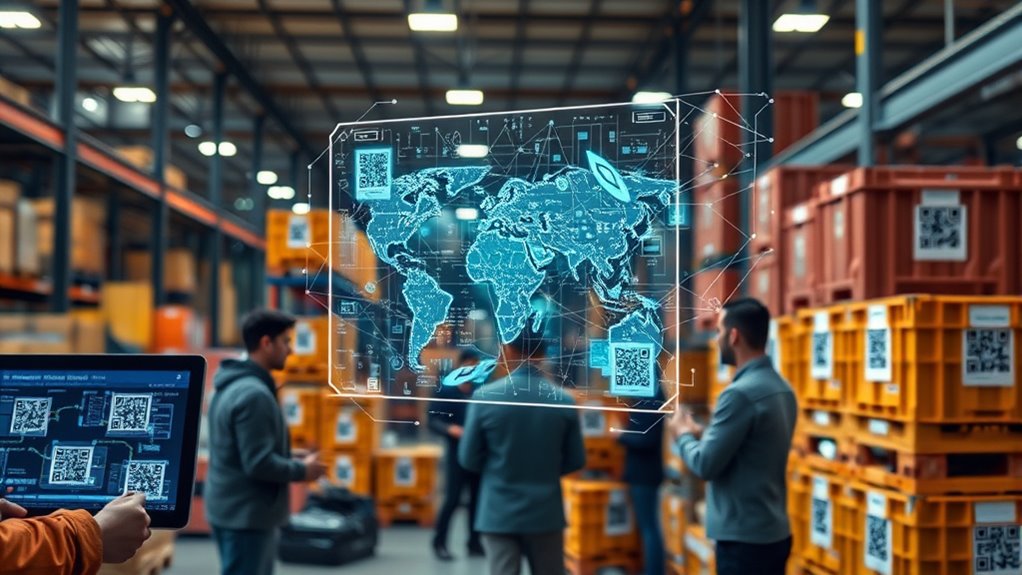Blockchain technology isn’t just for cryptocurrency. It’s transforming finance by enabling secure, fast transactions and promoting financial inclusion. In supply chains, you’ll find it enhancing transparency and efficiency while reducing fraud risks. Healthcare sees improved patient data management and secure sharing among providers. Governance benefits from tamper-proof public records, while identity security offers a robust alternative to centralized systems. Discover how blockchain impacts even more industries and opens up new possibilities for innovation.
Key Takeaways
- Blockchain enhances supply chain management by providing real-time visibility, traceability, and tamper-proof records to improve efficiency and accountability.
- In healthcare, blockchain secures patient data sharing, streamlines claims processing, and combats counterfeit drugs through improved traceability.
- Governance benefits from blockchain by ensuring secure, transparent management of public records and automating tasks to reduce fraud risks.
- Intellectual property management is revolutionized through blockchain by tracking ownership, automating licensing, and providing clear records to reduce infringement.
- Blockchain facilitates secure voting systems with verifiable processes, enhancing voter trust and accessibility while minimizing fraud risks.
Blockchain in Finance

Blockchain technology has revolutionized the finance industry in multiple ways, making transactions faster, more secure, and accessible.
With instantaneous processing, you can enjoy quicker payments while cutting down on traditional banking costs. The decentralized ledger ensures that every transaction is secure and transparent, protecting your data integrity.
Plus, cryptocurrencies eliminate the hassle of exchange rates and international transfer fees, saving you both time and money.
Cryptocurrencies simplify transactions by removing exchange rates and international fees, maximizing your savings and efficiency.
You’ll also find that blockchain enhances global accessibility, allowing anyone with internet access to participate in financial transactions.
This innovation not only streamlines your payment processes but also promotes financial inclusion for those previously underserved in the financial system.
Embrace the future of finance with blockchain at the forefront of your transactions.
Blockchain in Supply Chain Management

As supply chains become increasingly complex, leveraging blockchain technology can significantly enhance efficiency and transparency.
By eliminating intermediaries and automating processes with smart contracts, you streamline operations and reduce costs. Blockchain also boosts security, providing a tamper-proof record that minimizes fraud risks.
With real-time visibility, you can track goods throughout the supply chain, fostering trust among all stakeholders. This technology enables enhanced traceability, allowing you to monitor products from origin to delivery, which is vital for quality assurance and product recalls.
Additionally, integrating IoT devices and RFID tags with blockchain further optimizes inventory management and operational efficiency, ensuring that you stay ahead in today’s competitive market.
Blockchain in Healthcare

In the rapidly evolving healthcare landscape, leveraging blockchain technology can transform how patient data is managed and shared. It offers a decentralized infrastructure that enhances security and compliance with regulations like HIPAA.
You’ll benefit from improved data interoperability, as blockchain creates a unified ledger for patient records, reducing errors and enhancing care coordination. With blockchain, you can control your health data through cryptographic protocols, ensuring privacy and security.
Smart contracts automate access controls, allowing only authorized parties to view or modify records. This technology also streamlines claims processing, cuts administrative costs, and enables real-time tracking, enhancing transparency.
Ultimately, blockchain empowers you as a patient, fostering engagement and improving your overall healthcare experience.
Blockchain in Governance

Governments can significantly enhance their operations by adopting blockchain technology, which provides a secure and transparent framework for managing public records and processes.
By leveraging a decentralized ledger, you can boost security and transparency, making it resistant to tampering. This technology streamlines governance processes, cutting costs associated with traditional systems.
Additionally, blockchain ensures data integrity by making records immutable once entered. Smart contracts automate various governance tasks, reducing the risk of fraud and corruption.
You’ll also find that blockchain facilitates secure cross-border collaboration, enhancing efficiency.
Ultimately, implementing blockchain in governance leads to more effective and trustworthy public services, benefiting both governments and citizens alike.
Blockchain in Identity Security

While traditional identity management systems often leave personal data vulnerable to breaches, blockchain technology offers a robust alternative that prioritizes security and user control.
With its decentralized approach, you reduce reliance on centralized databases, minimizing the risk of data breaches. Advanced cryptographic techniques enhance data integrity, making identity theft far more difficult.
Blockchain also maintains transparency while protecting your privacy, allowing only authorized parties access to your information. The immutable nature of blockchain records secures your identity data, and you gain greater control over how and when you share it.
Blockchain in Other Industries

In exploring blockchain’s impact on various sectors, you’ll find its application in IoT security, digital asset trading, and intellectual property protection.
By enhancing security for IoT devices, simplifying digital transactions, and safeguarding creative works, blockchain is transforming how industries operate.
Let’s take a closer look at these exciting developments.
IoT Security Enhancements
Blockchain technology significantly enhances IoT security through several key features.
First, its decentralized framework reduces reliance on central authorities, boosting network resilience. You’ll appreciate that data on a blockchain is immutable, ensuring its integrity and preventing unauthorized changes.
Transparency is another advantage, as transactions are recorded on a public ledger, enabling clear auditing and accountability within IoT networks.
Consensus mechanisms like Proof of Work and Proof of Stake validate transactions, helping to prevent fraud.
Additionally, automated smart contracts enforce rules and conditions, minimizing human error and enhancing overall security.
Digital Asset Trading
As digital assets like cryptocurrencies and NFTs gain popularity, the landscape of trading has evolved dramatically. You can trade these digital assets on both centralized and decentralized exchanges, like Uniswap.
Digital wallets such as Metamask or hardware wallets securely store your assets. With blockchain technology, investment opportunities have broadened through the tokenization of real-world assets and staking, increasing liquidity and accessibility. Additionally, risk management strategies can help investors navigate the inherent volatility of these digital assets.
However, you should be aware of the growing regulatory oversight shaping this market, ensuring compliance and transparency. As traditional financial institutions adopt blockchain, the digital asset trading environment is transforming, creating new avenues for investors while enhancing the efficiency and security of transactions. Additionally, investing in Bitcoin IRAs offers tax-efficient growth for retirement savings, further diversifying one’s investment portfolio.
Embrace this evolution to stay ahead in the digital trading space.
Intellectual Property Protection
The rise of digital assets has sparked innovations across various sectors, including intellectual property (IP) protection.
Blockchain provides a decentralized platform that reduces reliance on central authorities, creating immutable records of ownership and creation timestamps. This transparency and security safeguard your IP assets from unauthorized access.
Smart contracts automate licensing processes, ensuring efficient royalty distribution and compliance checks. You can use blockchain for copyright protection, trademark management, patent verification, and even safeguarding trade secrets.
With global accessibility, managing IP becomes easier and more cost-effective, cutting out intermediaries. Additionally, organizations like WIPO are working to integrate blockchain into existing IP systems, paving the way for a more secure and efficient future in intellectual property management.
Frequently Asked Questions
How Does Blockchain Improve Cybersecurity Across Various Industries?
Blockchain improves cybersecurity across various industries by ensuring data integrity and enhancing transparency.
You benefit from its decentralized infrastructure, which reduces vulnerabilities and mitigates risks like DDoS attacks. With tamper-proof data storage, you can trust that sensitive information remains unaltered.
Additionally, robust authentication mechanisms provide secure access, protecting against unauthorized breaches.
What Are the Environmental Impacts of Blockchain Technology?
You might think blockchain’s energy consumption is off the charts, and you’d be right! Its high energy requirements lead to significant greenhouse gas emissions and contribute to climate change.
Plus, mining hardware generates e-waste, while producing that equipment depletes valuable resources.
However, blockchain also has environmental benefits, like enhancing supply chain transparency and supporting renewable energy initiatives.
Balancing these impacts is crucial for a sustainable future.
Can Blockchain Be Integrated With Existing Systems?
Yes, you can integrate blockchain with existing systems. Start by reviewing your current infrastructure to identify compatibility points.
Develop a tailored strategy that aligns with your business goals, and consider creating custom middleware to facilitate seamless data exchange.
You’ll want to design APIs for communication, ensuring data security through encryption.
While challenges like technical complexity and regulatory compliance exist, successful integration can enhance productivity and give your business a competitive edge.
What Are the Legal Implications of Using Blockchain?
When you use blockchain, you face several legal implications.
First, you must navigate jurisdictional challenges since blockchain operates globally, complicating compliance with local laws.
You’ll also need to ensure adherence to regulations like GDPR, especially regarding data protection.
Additionally, consider the enforceability of smart contracts and the liability issues surrounding decentralized networks.
Establishing clear governance and legal structures is essential to minimize risks and ensure compliance in your blockchain projects.
How Is Blockchain Affecting Job Markets and Employment Opportunities?
You might be surprised to know that blockchain’s reshaping job markets in real time.
As companies adopt this technology, you’ll see new roles popping up in fields like finance and supply chain management.
The demand for blockchain developers has skyrocketed, creating lucrative opportunities.
If you’re willing to upskill, you could find yourself in a high-paying job.
With blockchain’s rise, it’s clear that employment opportunities are expanding, so don’t miss out on this trend!
Conclusion
So, while you’re busy imagining blockchain as just a fancy way to buy digital cats, remember it’s actually reshaping entire industries. Who knew that the same tech powering your meme coins could streamline healthcare, secure identities, and even make governments slightly less chaotic? It’s almost like we’ve stumbled upon the magic wand of the digital age, and yet, here we are, still arguing about whether pineapple belongs on pizza. Priorities, right? Let’s hope we don’t waste it!










